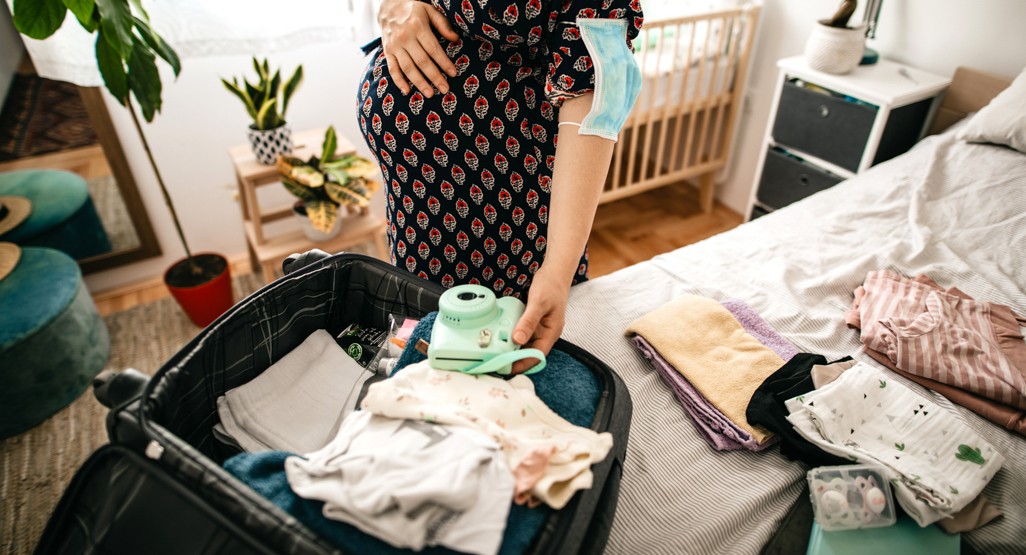Traveling while pregnant requires careful planning and consideration for your health and the well-being of your baby. While many women can travel safely during pregnancy, there are specific guidelines and restrictions, especially as you approach your due date. So, can I travel 34 weeks pregnant? Let’s delve into the details.
 Pregnant woman packing a suitcase for a trip
Pregnant woman packing a suitcase for a trip
Is Traveling at 34 Weeks Pregnant Safe?
Generally, most airlines allow pregnant women to fly domestically until they are 36 weeks pregnant. However, individual airlines may have different policies, and international travel often has stricter cutoff dates. Traveling at 34 weeks pregnant may still be possible, but it’s crucial to consult with your healthcare provider and the airline before making any plans.
Your doctor will assess your individual situation and any potential risks. Factors such as pre-existing medical conditions, pregnancy complications, and overall health will be taken into consideration. Some airlines may require a doctor’s note confirming that you are fit to fly.
Key Considerations for Traveling at 34 Weeks
Traveling at 34 weeks pregnant requires careful planning and awareness of potential risks. Here’s what to consider:
-
Airline Policies: Different airlines have different rules regarding pregnant passengers. Some may require a doctor’s note, while others may have earlier cutoff dates for international flights. Always check the specific airline’s policy before booking.
-
Medical Conditions: If you have any pre-existing medical conditions or pregnancy complications, such as placenta previa, pre-eclampsia, or a history of preterm labor, your doctor may advise against traveling.
-
Travel Insurance: Ensure that your travel insurance covers pregnancy-related complications and medical expenses that may arise during your trip. Look for a policy with a “cancel for any reason” clause.
-
Destination: Avoid traveling to areas with a high risk of infectious diseases, such as Zika virus or malaria. Also, consider the availability of adequate medical facilities at your destination in case of an emergency.
When to Avoid Travel During Pregnancy
There are certain conditions that would make travel during pregnancy unsafe:
- Severe Anemia
- Uncontrolled Gestational Diabetes
- Severe Nausea and Vomiting
- History of Preterm Labor or Miscarriage
- Placenta Previa
If you have any of these conditions, your doctor will likely advise against traveling.
The Best Time to Travel During Pregnancy
The second trimester (14-27 weeks) is often considered the safest and most comfortable time to travel during pregnancy. Morning sickness has usually subsided, and you’re not yet experiencing the discomfort and fatigue of the third trimester.
However, every pregnancy is different, and it’s essential to consult with your healthcare provider to determine the best time for you to travel.
Pregnancy Travel Checklist
Whether you are able to travel at 34 weeks pregnant or earlier in your pregnancy, preparation is key. Here’s a checklist to help you prepare for your trip:
- Consult Your Healthcare Provider: Discuss your travel plans with your doctor and get their approval.
- Know Your Prenatal Test Schedule: Plan your travel around any scheduled prenatal appointments or tests.
- Book an Aisle Seat: This allows for easy access to the restroom and the ability to stretch your legs.
- Gather Medical Records: Obtain a copy of your prenatal chart from your doctor, including important information such as your blood type, due date, and any medical conditions.
- Pack Medications and Prenatal Vitamins: Bring an ample supply of any medications you take, including prenatal vitamins.
- Have a Contingency Plan: Identify hospitals and doctors at your destination that accept your insurance in case of an emergency.
Staying Safe and Comfortable During Your Trip
During your trip, it’s important to prioritize your health and comfort:
- Stay Hydrated: Drink plenty of water to prevent dehydration.
- Eat Healthy Foods: Avoid raw or undercooked foods, and be mindful of food safety practices.
- Wear Comfortable Clothing and Shoes: Opt for loose-fitting clothing and supportive shoes.
- Take Breaks: Get up and walk around every few hours to improve circulation and prevent blood clots.
- Wear Compression Socks: These can help reduce swelling in your legs and feet.
 Pregnant woman wearing compression socks
Pregnant woman wearing compression socks
When to Call Your Doctor While Traveling
If you experience any of the following symptoms while traveling, seek immediate medical attention:
- Vaginal Bleeding
- Severe Abdominal Pain
- Ruptured Membranes (Water Breaking)
- Decreased Fetal Movement
- Severe Headache or Visual Disturbances
Conclusion
So, can I travel 34 weeks pregnant? The answer is: it depends. While it may be possible, it’s crucial to consult with your healthcare provider, check airline policies, and carefully consider your individual circumstances. By taking the necessary precautions and prioritizing your health and safety, you can make informed decisions about traveling during your pregnancy. Traveling safely while pregnant is possible with proper planning and medical guidance.